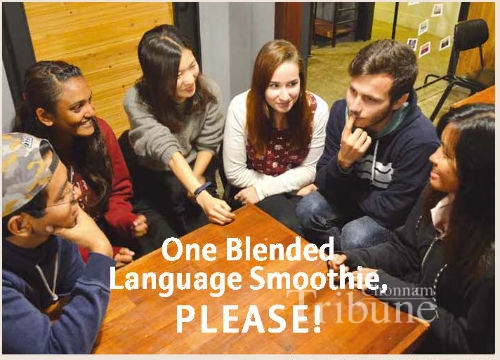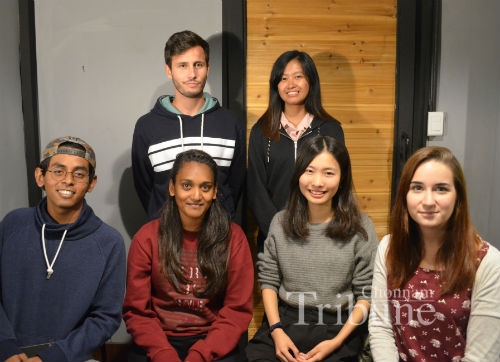Over the past decades, the usage of foreign languages in any culture has exponentially increased and has created new cultures that continue to evolve. International students shared their opinions about the usage of mixed languages. - Ed.

Globalization has been a long time coming and one of the unavoidable changes that it brings is mixed languages. Mixing languages begins with just a few foreign words that don’t find their perfect counterpart in the native language, but then those words develop nuances within the context of the native culture and can turn into something very different from the original meaning of the word. We were curious to know how different countries handled the situation of foreign languages and had a Tribune reporter discuss it with a group of international students.
Q. Have you noticed foreign languages being used in Korea? What do you think of it?
Hakim: Now that you mention it, I have noticed some English words that have been Koreanized. This shows that there is a transition in the culture as Koreans include more English words into their daily lives. Even though having such a homogeneous society has its benefits but it makes you very one-track minded in comparison to a multi-cultural society and it is good that they are accepting external influences.
Natsuho: Korea and Japan have long shared many cultural aspects including certain linguistic characteristics. When I was younger, on a trip to Korea, I remember finding Japanese on signboards and other signs, especially in tourist areas. More amazing than that, however, was finding a few local business owners here and there speaking in Japanese! This was very comforting and made me feel close to the local people, enabling me to gain a good experience in Korea. Those fond memories and sense of comfort are why I have returned to Korea.
Q. By mixing English with Korean we have Konglish. Is there any such thing in your country?
Olga: Actually in Spain we don’t have Spanglish. It just so happens that we take certain words from English and use them when we talk, just to seem trendy. But we haven’t had English words gain any deeper or different meaning over the years. These words are not in our dictionary but rather used as words of convenience.
Natacha: In the Philippines, our native language is Filipino that is based on Tagalog. But in our daily conversations we heavily mix Tagalog and English, causing us to code switch between the two languages. Recently, a new slang has developed from mixing English and Tagalog and speaking it in a certain accent. Upper class students who go to expensive universities in a posh district usually speak this slang. We call it Conyo. In my opinion, it’s very creative; here is why: Timbs (meaning ‘Why?’): TIMBs comes from TIMBa which means Bucket that sounds similar to Bakit that means Why. Starbs (meaning ‘to mimic something or someone’): STARBS comes from STARBucks that is the name of a coffee retail and Coffee sounds similar to Copy.
Nandini: Our country, Mauritius was originally an island with no indigenous people. Upon discovery, the island has been colonized by the Dutch, French and English. The island was populated by the slaves brought in by the imperialists from various countries including India, Pakistan, South Africa and so on. Our main language Creole was made as a combination of French and English. Hence, all Mauritians can speak English, French and Creole. I could say that we took the best of those languages and mixed it together to become our language.

Q. What are your thoughts on mixing two languages?
Adrian: Personally, it is very helpful to mix two languages. Especially for people who cannot speak more than one language, and arrive in a situation that requires them to speak another language. In Spain, many people living in small cities do not speak English. However, the closer you get to famous tourist destinations or the coastline, the more people speak English. This mixing of the usage of two languages can help people find their way in another country and also enable them to communicate with the locals.
Hakim: As a millennial, the interesting thing about Malaysia is that we have grown up in a mixed language environment that has created a whole new cultural identity for us. This new culture has become a platform for people from various ethnicities to interact. The main benefit has been that mixing languages has relaxed the racial tension that segregated our people and helped us become a more heterogeneous people.
Q. Do you think the world will eventually ever speak just one language? Why or why not?
Nandini: Yes and No. The huge culture of globalization that is taking over our lives in the way we eat and clothe is quite strong. It could be just a matter of time before we all speak the same language. But at the same time, we as a people love holding on to things that we identity with and thus people might not be willing to give up their own language as it is a part of their cultural identity.
Natacha: As Nandini said, people relate culture and language very closely. Due to which there may never be only one language in the world. However, we could develop a universal lingua franca that everyone can communicate with regardless of race, while at the same time preserving their own cultures and languages within their communities.
Defining Culture Is Defining Who I Am
Through this discussion we were able to realize how much we are grateful to have one language to share our thoughts and learn from various cultures. But at the same time it is because we all have our own cultures and languages that made the discussion interesting. We have to realize that our cultures survive through each life that is a part of it. Let’s live conscious of the fact that we are the preservers and innovators of our culture and not the other way around.
***************************************************
Muhamad Hakim Bin Razman, Dept. of Natural Earth Sciences
Nandini Rungen, Student Taking Korean Regular Course
Natsuho Tsuda, Dept. of English Language and Literature
Natacha Boaphuan, Dept. of Korean Language and Literature
Adrian Lopet Naras, Dept. of Mathematics
Olga Caballero Castillo, Dept. of Mathematics
By Alvina Joanna, Guest Reporter

